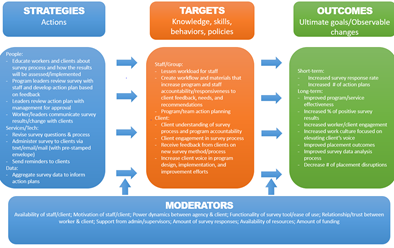The mission of the Institute for Child and Family Well-Being is to improve the lives of children and families with complex challenges by implementing effective programs, conducting cutting-edge research, engaging communities, and promoting systems change.
The Institute for Child and Family Well-Being is a collaboration between Children’s Wisconsin and the Helen Bader School of Social Welfare at the University of Wisconsin-Milwaukee. The shared values and strengths of this academic-community partnership are reflected in the Institute’s three core service areas: Program Design and Implementation, Research and Evaluation, and Community Engagement and Systems Change.
In This Issue:
- Meet the ICFW
- Research and Evaluation
- Community Engagement and Systems Change
- Recent and Upcoming Events
Meet the ICFW

Meet Our Translational Design Coordinator – Megan Frederick-Usoh
The ICFW recently created a new position, Translational Design Coordinator, to support both a strategic and operational evolution within our design and capacity-building projects. We are excited to announce that Megan Frederick-Usoh has recently joined our team in this new role.
Megan has over 16 years of experience in public health and child welfare. She has worked in both the for-profit and non-profit sectors in foster care, injury prevention and with adults with intellectual and developmental disabilities. Megan began her tenure with Children’s Wisconsin in 2019 as a Treatment Foster Care Recruiter and Educator, with an additional focus on program evaluation. She earned a Bachelor of Arts degree in Psychology, Political Science and Criminal Justice from the University of Tennessee, Honors College-Knoxville.
Meet Our Predoctoral Fellows
The ICFW recently launched a predoctoral fellowship training program that will provide mentorship and funding to doctoral students whose research can be applied to promote better and more equitable outcomes for children and families. We are proud to announce the selection of two predoctoral fellows for 2022: Darejan Dvalishvili and Anthony Gómez.
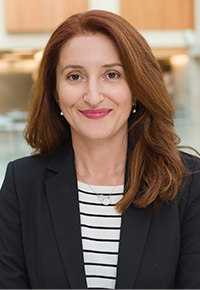
Darejan Dvalishvili is a predoctoral fellow at the Institute for Child and Family Well-Being. She is completing her Ph.D. in social work at Washington University in St. Louis. Her research focuses on intersections of poverty, child maltreatment, and adverse childhood experiences. Following her work with UNICEF and other international and local non-profit organizations, her interests include exploring the impact of various economic interventions on children’s wellbeing both in the US and globally. Darejan earned an MSW from Columbia University (New York, US) and an MD from Tbilisi State Medical University (Tbilisi, Republic of Georgia).
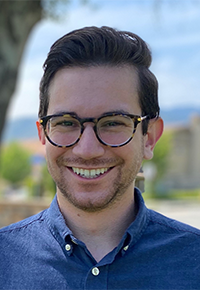
Anthony Gómez is a predoctoral fellow at the Institute for Child and Family Well-Being. Anthony’s research broadly focuses on child and family well-being, and its relationship to the child welfare system. Driven by professional experience working in early education and child welfare, he is interested in understanding how service systems can better fulfill the material and emotional needs of parents and caregivers, and in turn, how such support can improve parenting, mental health, and child development outcomes. Anthony holds a master’s degree in social welfare from UCLA and is currently a doctoral student at the UC Berkeley School of Social Welfare.
Meet our Parent Child Interaction Therapy (PCIT) Trainer Team
During the past month, our Parent Child Interaction Therapy Trainer Team of Dimitri Topitzes and Leah Cerwin has begun delivering the PCIT International Within Agency Trainer (WATer) training to our team member, Meghan Christian. Dimitri became a Certified PCIT International Regional Trainer in 2020, a distinction held by less than fifty PCIT therapists globally, and Leah became a Within Agency Trainer in 2019. We are excited to add Meghan to our training team, so that we may train more clinicians within Children’s and across the state in order to provide greater access to this effective therapy for children and their caregivers.
Research and Evaluation
The Institute accelerates the process of translating knowledge into direct practices, programs and policies that promote health and well-being, and provides analytic, data management and grant-writing support.
Recent ICFW Publications
Effects of COVID-19 on Home Visiting Services for Vulnerable Families
ICFW faculty published a multi-state study that documented the toll of the pandemic on home visiting programs that offer services and support to new and expectant parents. Compared to pre-pandemic levels, post-COVID enrollments decreased by 33–36% and total visits fell by 15–24%. These findings are especially concerning given the vital role that these programs play in supporting children and families from more vulnerable and marginalized populations.
Community Engagement & Systems Change
The Institute develops community-university partnerships to promote systems change that increases the accessibility of evidence-based and evidence-informed practices.
Strong Families, Thriving Children, Connected Communities Initiative
Children thrive when they have regular interactions with responsive, caring adults. Families experiencing significant stressors related to financial insecurity, housing instability, or the impact of systemic and interpersonal trauma can be overloaded with stress, interrupting those interactions. Families that are experiencing this overload of stress are at greater risk for having neglect identified as a threat to their child(ren)’s safety. If we ensure that communities are equipped to ease the burden on overloaded families, we make resilience a real possibility.
Neglect is cited as the primary or contributing reason for 73% of family separations into foster care nationally and 68% here in Wisconsin. Neglect is frequently defined as the failure of a parent or other person with responsibility for the child to provide needed food, clothing, shelter, medical care, or supervision to the degree that the child’s health, safety, and well-being are threatened with harm[1]. Children who experience the trauma of family separation for reasons of neglect are more likely than not to return home. Overloaded families are left vulnerable by systems that are misaligned to meeting their basic necessities. Poverty, trauma, and systemic racism are some of the deep seeded root causes to this inequity. We believe that there are pathways forward to preventing a significant portion of these separations from happening.
The conditions that lead to family separations for reasons of neglect are complex, extending beyond any single system or solution. The goal of the Strong Families, Thriving Children, Connected Communities (SFTCCC) initiative is to reduce the number of family separations for reasons of neglect by building a community focused on collaboratively pursuing policies and practices that support overloaded families and address systemic failings. SFTCCC is a developmental strategy at its core, recognizing that more can be accomplished through shared learning and action to address the drivers of systems change that either hold the conditions that contribute to neglect in place or provide scaffolding for progress.
Children’s ICFW team will strive to support programs, organizations, and communities to collaborate on solutions and generate knowledge to address these complex challenges families overloaded by stress face before safety threats emerge. By elevating the latest thinking and resources we hope to foster a community of changemakers, support shared learning, expand their networks, and inspire innovation and collaboration.
To learn more and sign up to get involved, please visit the SFTCCC project page.
[1] For a further discussion about what constitutes child neglect, see Child Welfare Information Gateway’s Acts of omission: An Overview of Child Neglect.
Voice of Lived Experience in Program Design and Improvement
By Luke Waldo
COVID-19 has created enormous stress on families, staff, and communities, and exposed existing and new challenges that families face when it comes to accessing and benefitting from supportive services. In response to these new challenges, we conducted our strategic learning process with the COVID Resilience Plan through which we learned that we could better meet the needs of our clients if we increased the voice of lived experience in our program design, implementation and improvement efforts. “…Lived experience brings value, particularly in contexts with rich histories, cultural nuances, and generations of communal knowledge. These are the things we can’t bottle up in a diagram or find best practices for in a textbook” (Ali, 2019).
When we elevate the voice of lived experience and create authentic engagement and accountability between our program staff and clients, we “prioritize relationships, increase trust across all stakeholders, and use participatory approaches to ensure the work is guided by those most affected” (Hayden et al). So, how might we bring the voice of lived experience to our programs’ training, use of evidence-based models, and “content expertise” to ultimately deliver more positive outcomes for the children and families that we serve?
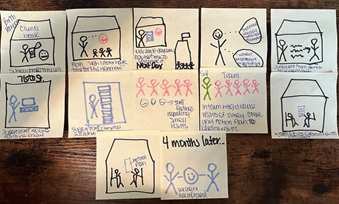
Many programs already include the voice of lived experience in their program design and improvement efforts in the form of:
- Program completion/ satisfaction surveys
- Focus groups
- Family Advisory Councils
- Parent Advocates
Through the use of these approaches, programs can better understand our clients’ needs, barriers, priorities, and strengths. Empowered with this knowledge, we are better positioned to design, implement, and adapt programs that more effectively meet our clients where they are, build trust, and lead to better engagement. Additionally, these approaches can provide feedback on what works and what doesn’t work for our clients, so that we may make program improvements that demonstrate authentic engagement and accountability to those we serve.
Children’s Child Well-being Programs’ Voice of Lived Experience Journey
Prior to COVID-19, Children’s Child Well-being leadership was polled on its priorities, and the overwhelming majority chose “client voice” in program activities and improvement as its top priority. In 2020, through the COVID Resilience Plan we conducted 19 After Action Reviews, in which it became clear that there were three core areas that we needed to prioritize:
- Client Voice/Community Engagement in Program Design and Improvement
- Virtual Practice/Service Delivery and Training
- Remote/Work from Home Transitions
Consequently, we developed a Community Engagement in Program Design and Improvement Community of Practice, which met over four months and developed three core recommendations, which were then presented as the primary design objectives of the Champions team that represented each program area of the Child Well-being department.
Framing the Challenge
Upon recruiting Champions from each program area across the Child Well-being department, we focused our design project on the following question, so that we could effectively design program and department-wide policy and practice recommendations.
As our service environment has changed due to families’ complex situations and needs – COVID-19, access and technology issues, cultural needs, etc. – how might we increase and/or center family/client voice in our program design, implementation, and improvement processes?
Our Translational Design Process
Over the course of 8 working 90-minute meetings, we centered the Champions team activities on the three COVID Resilience Plan Community Engagement recommendations.
- Develop a Parent Advisory Council
- Improve Client Satisfaction Survey process
- Develop a client readiness/access assessment process
Our Translational Design process centers the principle that the lived experience of the professional and client should be present in all activities while also elevating the best available evidence from our fields. As a result, each phase of the process incorporated reflective practices, client and colleague feedback, and tools that centered the client’s experience, relationships and needs.
- Frame the Challenge. Define accountability.
- Create sub-committees for each core recommendation based on Champions’ experience and interests.
- Storyboard.
- Prototype Workflow.
- Theory of Change.
- Best practice readings.
- Office Hours.
As the Champions completed their Storyboards, Prototype Workflows, and Theories of Change, they worked closely with their sub-committee partners to review and reflect on their ideas before sharing them with their colleagues and clients for further feedback. They then reworked their ideas and updated the tools to reflect what they had learned. Lastly, they shared their tools on our Basecamp page where all Champions could review them and share their lessons learned. Additionally, throughout the process, the Champions could attend Office Hours with me to work individually on their tools, reflect on what they had learned, and make final updates before submitting to Basecamp.
In our final phase of the design process, we reviewed best practices and evidence by reading literature from national and local partners that have been strong examples of incorporating lived experience into their organizational practices and culture. We then made final additions to our design projects or cited those ideas that we had already developed that are supported by evidence.
In the coming weeks, we will present our final policy and practice recommendations along with a number of the design projects to the Child Well-being leadership team to determine how we might implement them.
References:
Ali, Kareeshma. (2019, February 8) There is an imbalance between lived and learned experience. Retrieved from: https://medium.com/@kareeshma/there-is-an-imbalance-between-lived-and-learned-experience-975d7f35d1bc
Hayden, Justin, Kalra, Surbhi, Rudd, Christopher, Walker, Justin. How can organizations assess their readiness to co-design? Casey Family Programs, Questions from the Field. Retrieved from: https://www.casey.org/codesign-lived-experience/
Learn More:
Translational Design Workshops – If you are interested in learning more about our Translational Design workshops, contact Luke Waldo at lwaldo@chw.org.
Storyboarding – IDEO
Theory of Change – Center on the Developing Child at Harvard University
Trauma and Recovery Project Training

As the final year of Trauma and Recovery Project 5-year SAMHSA grant comes to a close, the final cohort of 21 Trauma-Focused Cognitive Behavioral Therapy trainees from around the state of Wisconsin completed their last synchronous training days. Already this cohort has begun treating 55 child and families affected by post-traumatic stress. During these training days, topics included developing and processing a trauma narrative, identifying supportive caregivers to serve as a witness to the narrative, in-vivo exposure, developing future resilience and safety and creating resilience and longevity in clinicians using the Components for Effecting Clinician Experience and Reducing Trauma (CE-CERT) model by Dr. Brian Miller. Cohort trainees will continue to develop their practice through literature review and consultation with the trainer, Jennifer Wilgocki, LCSW and ICFW team member, Meghan Christian.
If you would like to refer a family to a Children’s provider for trauma therapy, please call 414-266-3339. You can also search for certified clinicians by visiting https://tfcbt.org/ or check out our website’s map of Wisconsin TF-CBT therapists here.
Learn More
More information on Trauma-Focused Cognitive Behavioral Therapy can be found at https://www.nctsn.org/.
If you would like to learn more about Components for Effecting Clinician Experience and Reducing Trauma click here: http://oklahomatfcbt.org/wp-content/uploads/2019/05/CE-CERT-Overview-Handout.pdf
Recent and Upcoming Events
The Institute provides training, consultation and technical assistance to help human service agencies implement and replicate best practices. If you are interested in training or technical assistance, please complete our speaker request form.
Presentations, Trainings and Workshops:
January 2022
PCIT Within Agency Trainer (WATer) Training
February 2022

Frontiers of Innovation and Children’s Home Society of America Webinar
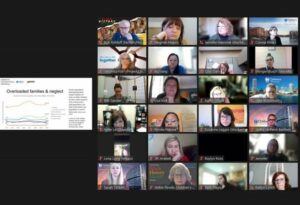
Roundtable on Overloaded Families with Children’s Wisconsin’s Community Services Programs
- If you are interested in attending an upcoming Roundtable, please provide your contact information in the link above.


